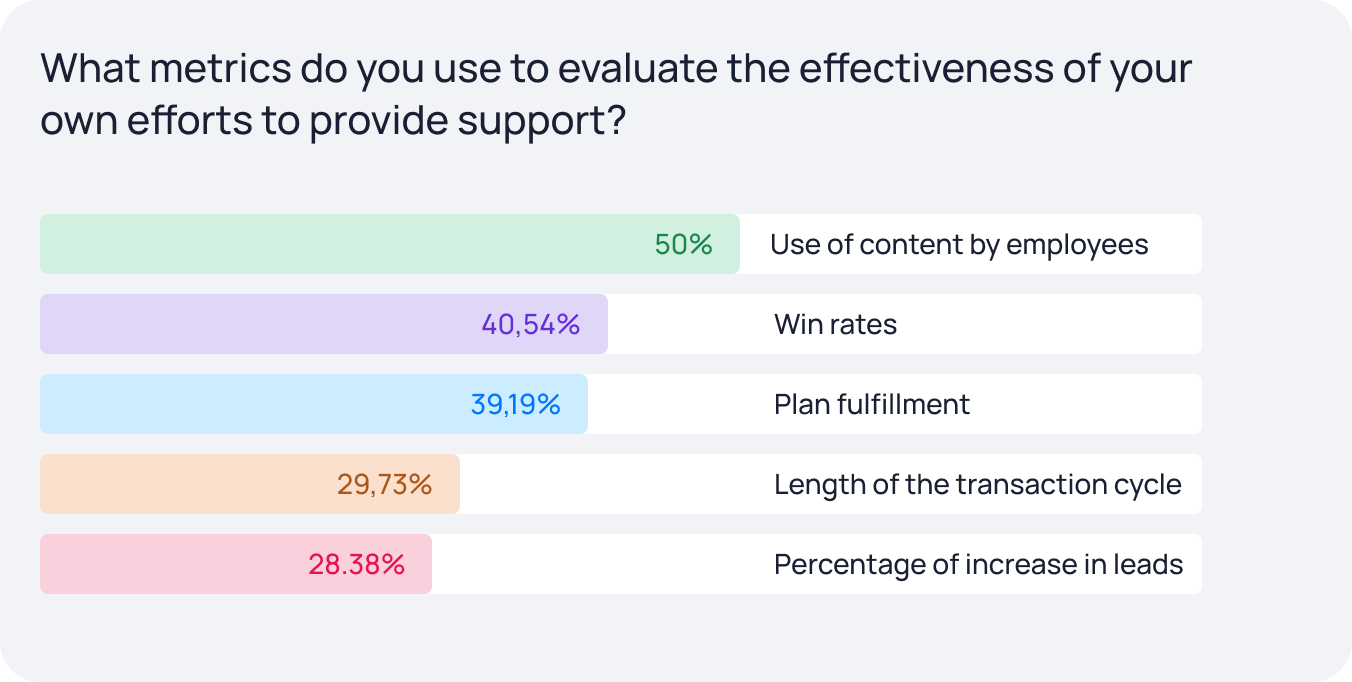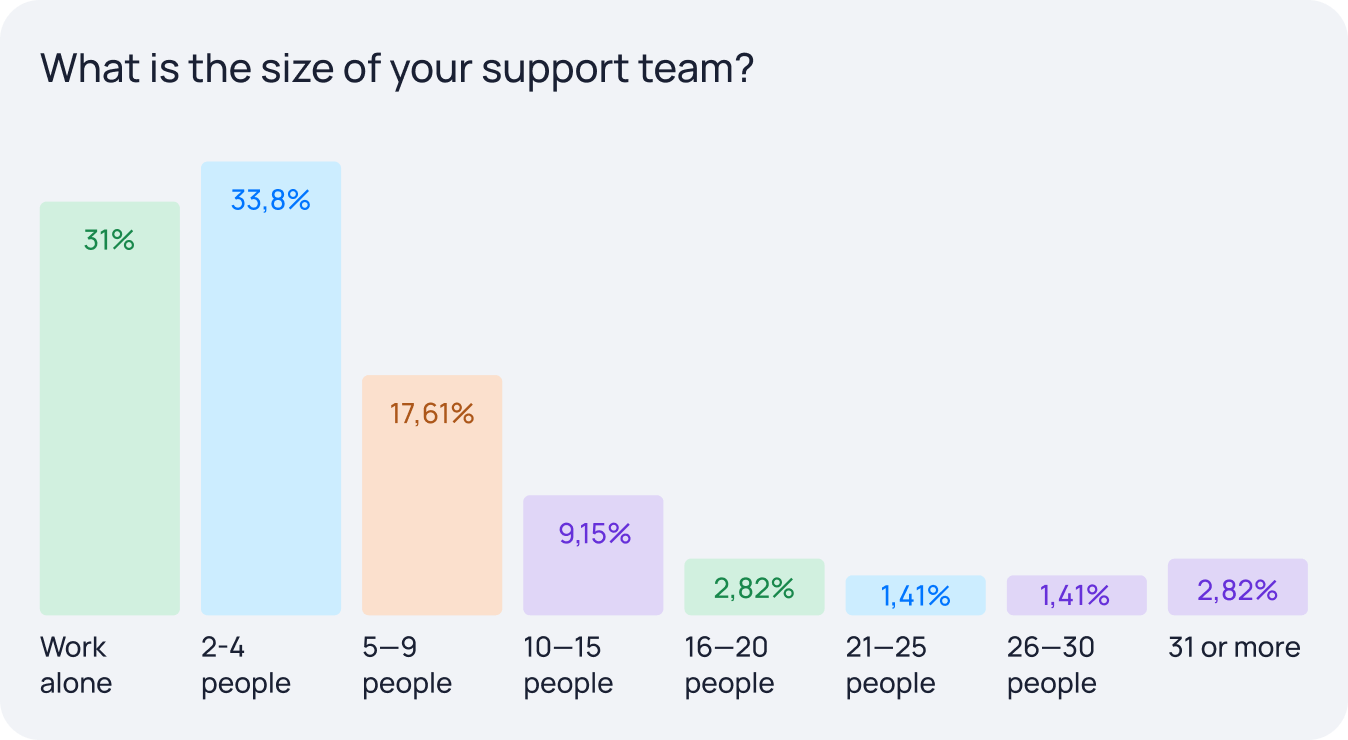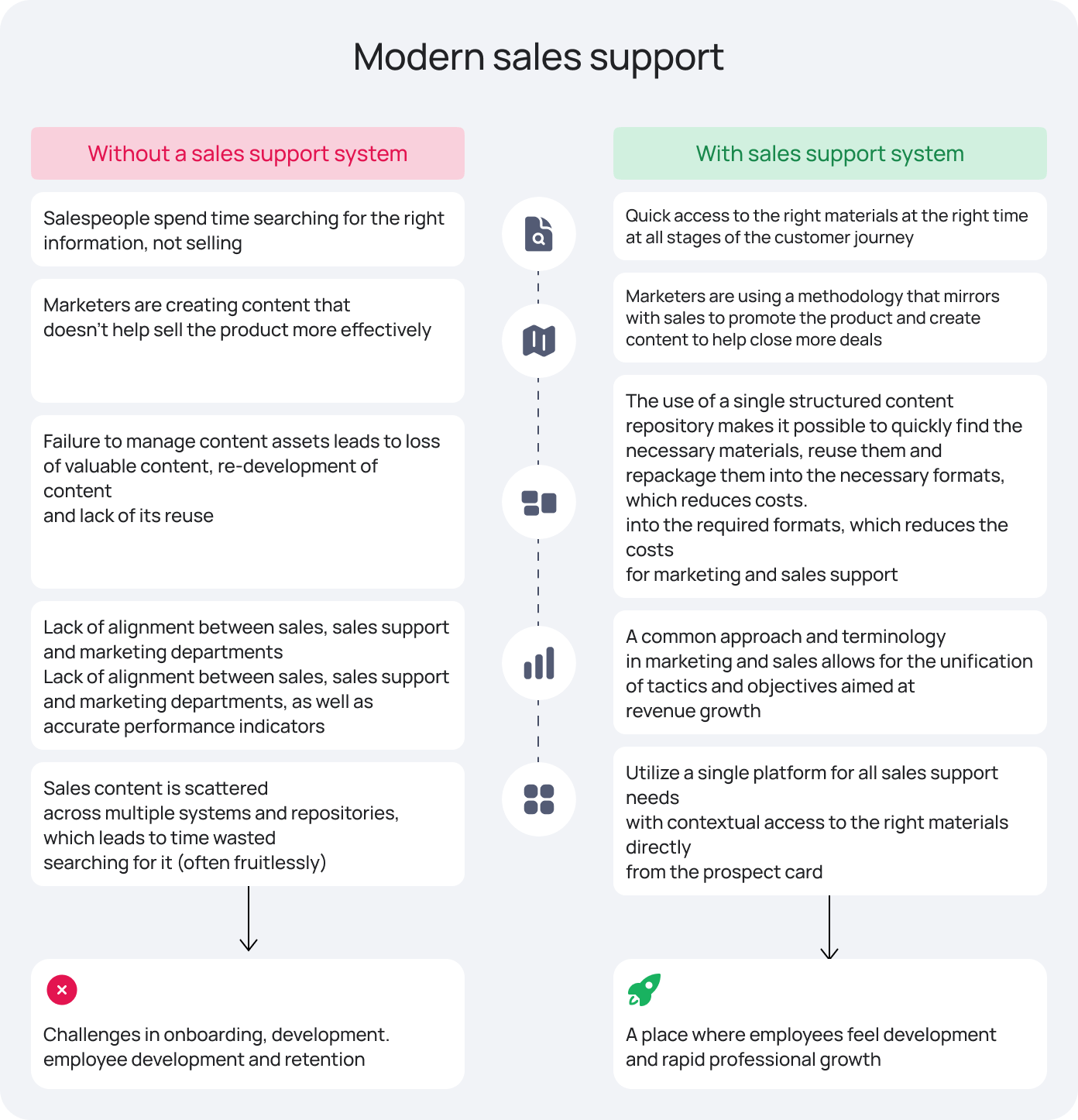Sales Enablement is a comprehensive approach to improving sales performance by providing employees with the tools, knowledge and skills they need. The concept goes far beyond simply training salespeople, encompassing a wide range of activities that enable the sales team to perform at their peak.
The Sales Support System is based on the idea that success in sales depends not only on the talent and experience of individual managers, but also on the infrastructure that supports them. This system brings together various aspects of the business, including marketing, training, technology and data analytics, to create a holistic ecosystem that fosters sales success.
Sales support system components:
- Training and development: Ongoing professional development of sales staff, including learning new sales techniques, deepening product knowledge and developing communication skills.
- Content Management: Creating, organizing and distributing relevant materials that help salespeople effectively interact with customers at various stages of the sales funnel.
- Technology solutions: Implement and optimize tools that simplify the work of sales managers, from CRM systems to analytics and automation platforms.
- Process Analysis and Optimization: Continually monitor and improve sales processes based on data and feedback from the team.
- Marketing Alignment: Ensuring sales and marketing work closely together to create aligned messages and strategies.
- Coaching and Mentoring: Individually supporting sales team members to develop their strengths and overcome weaknesses.
Implementation of such a system is especially critical in the B2B sector, where transactions are characterized by long cycles, complex decision-making processes and the need for a deep understanding of the specifics of the client’s business. In this context, a sales support system becomes not just a useful addition, but a prerequisite for achieving and maintaining a competitive advantage in the market.
Why is a sales support system important?
The importance of a sales support system stems from its direct impact on key business performance indicators and its ability to adapt companies to changing market realities.
Impact on sales and revenue:
- Enhance conversion rates: Companies with strong sales enablement demonstrate higher conversion rates at all stages of the sales funnel. According to research organizations with a support system achieve a 49% success rate in predicted deals, compared to 42.5% for companies without such a system.
- Sales Cycle Shortening: Armed with relevant content and tools, sales managers move customers through the funnel faster, which is especially critical in the B2B segment with its long deal cycles.
- Enhance average check: Deeper understanding of the product and customer needs allows you to offer value-added services more effectively, adding value to each deal.
- Resource Optimization: Automation of routine tasks and centralization of information reduce unproductive time, increasing sales team productivity.
Adaptation to customer behavior:
- Customer awareness: B2B customers come to the first contact already prepared. The sales support system provides managers with the tools to work with well-informed customers, allowing for a deeper level of dialog.
- Omnichannel: Buyers expect a consistent experience across multiple channels. A sales enablement system ensures consistent communications and content across all touchpoints.
- Personalization: B2B customers expect a personalized experience. The tools and data provided by the sales support system allow for more precise targeting of offers and communications.
- Decision-making complexity: In the B2B segment, decisions are often made by a group of individuals. A sales support system helps managers to work effectively with multiple stakeholders, taking into account their different roles and interests.
- Market Dynamics: Rapid changes in industries require salespeople to constantly update their knowledge. A sales support system ensures continuous training and rapid dissemination of up-to-date information.
Sales Support System Objectives
Main goal: increase profitability
Sounds trivial? Only at first glance. It’s not just about increasing sales, but about a comprehensive approach to improving the efficiency of each element of the process:
- Enhancing the average transaction check
- Speed up the closing process
- Optimize customer acquisition costs
Faster adaptation of new employees
An effective sales support system significantly reduces the time it takes for new employees to reach full productivity. This is accomplished through:
- Structured onboarding programs
- Access to knowledge base and best practices
- Interactive training modules and sales simulations
- Mentoring and coaching system
Enhance the effectiveness of sales managers
Even experienced salespeople can significantly improve their effectiveness with the right support. The system aims to:
- Automization of routine tasks
- Providing real-time analytics
- Personalized recommendations for working with each lead
- Continuous skill development and knowledge updating
Improving customer interactions
In B2B, the customer expects not just a product, but a solution to their problems, so it is critical to position sales managers as experts and consultants. A sales support system facilitates this through:
- Providing a deep understanding of the customer’s product and industry
- Tools for creating personalized offers
- Permanent updates on market trends and competitors
- Developing skills to identify and meet needs
Content to support sales
Content is a critical element of a sales support system, providing employees with the materials they need to effectively engage with customers at all stages of the sales funnel. This content not only informs, but also persuades, helping to overcome objections and move deals toward closing.
Sales support contentis is any material that managers use in the sales process. It differs from pure marketing content in its specificity and depth of detail required to make a buying decision.
The importance of quality content can hardly be overemphasized: it significantly increases the effectiveness of communication, helping managers to clearly and convincingly convey the value of the offer. Unifying messages ensures consistency of information communicated to customers by different employees, which is important for building trust in the brand. In addition, having materials ready to go allows managers to save time by responding to customer inquiries faster. In complex B2B sales, such content becomes an indispensable tool, providing arguments and data to work with objections and doubts of clients.
Measuring sales support results: key metrics
According to research, sales support professionals identify the following metrics:

These figures show how varied approaches to measuring the effectiveness of sales support systems are, and emphasize the importance of a comprehensive approach to measuring results.
The Importance of Content Utilization
According to the report, half of sales support professionals consider content utilization as a key success metric. This fact underscores the critical importance of not only creating quality content, but also actively utilizing it by the sales team.
“In complex B2B sales, even more so in IT, expert content is critical for both sales and marketing. Its systematic collection, packaging and broadcast is a strong competitive advantage for IT solution and platform sellers”,
— commented Tatiana Kornilova, Russia’s leading expert on complex B2B Pragmatic Sales
High content usage indicates:
- Relevance of materials;
- Efficiency of their distribution system;
- Active use of the provided tools by the team.
In contrast, low utilization can signal serious problems, from content not matching needs to difficulty accessing materials or insufficient training on how to use them. Moreover, it can indicate underlying problems with sales team alignment, which is especially critical in the B2B segment.
A deep analysis of content effectiveness requires not only tracking frequency of use, but also examining the impact on specific deals. This includes analyzing the types of content that are most effective at different stages of the sales funnel, the correlation between the use of certain content and the success of closing deals, and collecting and analyzing feedback from customers.
Implementing a Data Culture
Implementing a sales support performance measurement system requires not only technical implementation, but also a cultural change in the organization. It is important to create an atmosphere where data analysis becomes the basis for decision making and continuous improvement becomes the norm.
Regular analysis of metrics allows:
- Identify areas for improvement
- Evaluate the ROI of investments in a sales support system
- Justify the need for further investments
- Adjust strategy to meet changing business needs
Finally, measuring sales support results involves creating a cycle of continuous improvement, where each improvement in the support system is directly reflected in the company’s business performance. This approach allows not only to optimize current processes, but also to create a solid foundation for long-term growth and business development in a highly competitive B2B sales environment.
Who is responsible for the sales support system?
The responsibility for the sales support system can be distributed differently depending on the size and structure of the organization. Consider the main options.
Distribution of responsibility in companies
Small and medium-sized companies most often do not have a dedicated sales support team. Instead, responsibility is divided among several departments:
- Marketing: usually responsible for creating content and sales materials.
- Sales: takes charge of training new hires and developing the skills of the team.
- Product Marketing: provides product and competitor information.
- Sales department: department leadership can provide coaching and support to managers.
In such companies, sales support tasks are performed either formally or informally, depending on the specific organizational structure and culture.
The role of specialized sales support departments
In larger organizations with sufficient budgets, individual specialists may be allocated or even entire sales support teams may be created. According to research the most common size of such teams is between 2 and 4 people. About 33.8% of companies surveyed have teams of this size.
These specialized departments are usually responsible for:
- Development and implementation of sales support strategy
- Creating and managing content for sales
- Organize sales team training and skills development
- Implementation and management of technology tools to support sales
- Efficiency analysis and continuous process improvement
It’s important to note that even with a specialized department, effective sales support requires close collaboration between different parts of the company. The sales support team often acts as a liaison, ensuring consistency between sales, marketing, product management and other departments. It is important to note that even with a specialized department, effective sales support requires close cooperation between different departments of the company.
Regardless of how responsibility is distributed, top management support is a key success factor. When management understands the importance of a sales support system and actively supports its development, it greatly increases the chances of a successful implementation and effective operation of such a system.
Tools for Sales Support
- Content Management Systems (CMS): help organize, store, and distribute content to support sales.
- Learning Management Systems (LMS): are used to organize and deliver training to the sales team. They help in onboarding of new employees and continuous skill development of the existing team.
- AI-powered tools: AI-powered tools, such as conversation analytics systems, help automate routine tasks and provide valuable insights to improve the sales process.
- CRM platform for sales support: these solutions combine the various functionality required for effective sales support into one system. Especially effective are specialized CRM for B2B sales designed to meet the specifics of complex corporate sales. Such systems include functionality for managing long deal cycles, preconfigured content development processes, tight integration with marketing, etc.
When selecting sales enablement tools, it is important to consider the following factors:
- Match the specific needs of your organization.
- Easy to use and integrate with existing systems.
- Scalability of the solution.
- Operational analysis and reporting capabilities.
- The level of support and training provided by the vendor.
- For B2B sales: the system’s ability to support complex, multi-step transactions.
Conclusion
Implementation of a sales support system fundamentally changes the company’s approach to working with clients and managing internal processes. An effective system allows overcoming typical problems faced by sales and marketing departments. It provides quick access to the necessary information, improves interaction between departments and optimizes the use of resources. As a result, the company not only increases efficiency, but also creates a more attractive environment for sales talent.
So, investing in a sales support system is a step that can significantly strengthen a company’s position in the market and increase its competitiveness.



